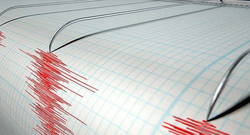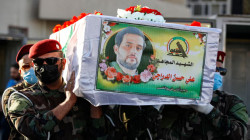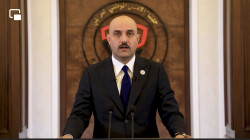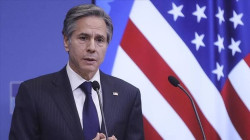The Year 2023: promising beginning shadowed by disasters and wars

Shafaq News / After commencing with a symbolic sense of optimism in 2023 marked by Iraq hosting the Gulf Cup championship for the first time since 1979, the year quickly shifted gears toward harsh and agonizing turns. It began with the catastrophic Turkish-Syrian earthquake, culminating in the eruption of war in Gaza. This incident has resulted in over 70,000 deaths and injuries so far, accompanied by unprecedented destruction in the area.
Sparks have ignited wider confrontations that could potentially unfold regionally, with Iraq finding itself not isolated from these repercussions.
Iraq's joy was bolstered by the national team winning the "Gulf Cup 25" for the fourth time in its history. This achievement added momentum to Iraq's efforts to turn the page on decades of violence, instability, and isolation. These efforts included external visits by Iraqi Prime Minister Mohammed Shia Al-Sudani to European and Arab countries, including the Arab summit in Jeddah, Saudi Arabia, in May, emphasizing Iraq's desire to reclaim its status and role. This was further articulated through the announcement of the strategic project known as the "Development Road".
However, the Iraqi year was not without its challenges. On July 20th, anger escalated in Iraq over repeated incidents of Sweden allowing an Iraqi dissident to burn copies of the Quran on its soil. Protesters stormed the Swedish embassy in Baghdad. Additionally, Iraq witnessed a tragic day on September 26th, with hundreds killed and injured due to a fire that broke out at a wedding hall in Nineveh.
In the vicinity of Iraq, the year 2023 witnessed positive developments, especially through the "historic reconciliation" that took place between Saudi Arabia and Iran under China's auspices in March. This reconciliation raised high hopes that the pages of tension and confrontation between the two sides, which have had significant regional implications in Yemen, Iraq, Syria, Lebanon, and others, might be turned over.
Arguably, the Saudi-Iran reconciliation in March remains one of the most significant events that attracted global and regional media attention, given its significance, timing, and potential repercussions, particularly concerning Chinese and American influence in the Middle East and their conflict.
This development also raised more questions about whether Saudi Arabia is getting closer and closer to Russia and China at the expense of its relationship with Washington, especially amid the escalation of the conflict between Moscow and Washington, particularly in the context of the Ukrainian crisis.
In Syria, several developments emerged, including Saudi Arabia's decision to re-engage with President Bashar al-Assad and Damascus reclaiming its seat in the Arab League. Additionally, several foreign ministers from Arab countries, including a Saudi minister, visited the Syrian capital, paving the way for President al-Assad's visit to Jeddah (Arab Summit) and then Riyadh (Arab-Islamic Summit).
The Gaza War
Arguably the most significant event during 2023 was the outbreak of the conflict between Israel and Hamas, initiated by Hamas's "Operation Al-Aqsa Flood" on October 7th. The Israeli military responded with "Operation Iron Swords", which remains ongoing and is believed to have caused the deaths of over 20,000 people, with more than 50,000 others injured, the majority of whom are Palestinians.
Despite more than 73 days passing since the armed confrontation, during which the Palestinian movement managed to breach the longstanding military blockade imposed on the Gaza Strip, infiltrate Israeli territories and settlements, and capture hundreds of prisoners, the Israeli ground, air, and naval assaults persist. Although some prisoner exchanges occurred between both sides, the conflict continues.
Due to this war, US forces have redeployed across various areas in the region, dispatching numerous naval vessels, including aircraft carriers. Additionally, the US established an ongoing aerial bridge to Israel for transporting weapons and military equipment, described by Washington as a measure to prevent regional conflict escalation. However, it has thus far sparked sparks of conflict at the regional level, affecting Iraq, Yemen, Lebanon, Syria, albeit to a limited extent.
Among the significant developments during this conflict was Yemen's involvement within the so-called "Resistance Axis", targeting Israel with missiles and drones. In a subsequent stage, they intercepted and targeted Israeli commercial ships or those dealing with Israeli ports, further intensifying the regional tensions.
Moreover, this war has triggered one of the worst humanitarian crises witnessed in years. The Israeli offensive has displaced hundreds of thousands of Palestinians in a confined geographical area with limited open routes to the outside world. Washington has thus far refused to allow the passage of a United Nations Security Council resolution mandating both parties to cease hostilities, taking positions that grant the Israeli military more time to achieve its invasion objectives.
Regionally and globally
The world witnessed a series of disasters and incidents, notably the Turkish-Syrian earthquake on February 6th, which devastated vast areas in multiple Turkish and Syrian cities and towns, resulting in more than 60,000 fatalities and injuries.
Additionally, massive forest fires struck Chile during the same month, claiming hundreds of lives and causing numerous injuries. Another shocking incident occurred in Greece on February 28th when a train accident resulted in the deaths of around 60 people and left dozens injured, sparking protest demonstrations.
Furthermore, a devastating cyclone led to the deaths and injuries of hundreds in Bangladesh and Myanmar. Forest fires in Hawaii claimed the lives of nearly 100 people, while a fire in Johannesburg, South Africa, resulted in approximately 150 casualties.
Morocco and Libya also faced disasters, with an earthquake in the former claiming thousands of victims and floods in the latter causing hundreds of deaths.
Among the peculiar incidents was the announcement of the deaths of 90 individuals and the disappearance of 200 in Kenya on April 24th, as part of a bizarre religious ritual involving self-starvation.
Regarding the Russo-Ukrainian War, two notable developments occured, the first was the failure of the "counter-attack" that Kyiv and its Western allies had promised against Russian forces in eastern Ukraine, for which billions of dollars, arms, and ammunition were invested. The second was the rebellion of the Russian "Wagner Group" in July, appearing to be against Russian President Vladimir Putin but swiftly halted. It was followed by the announcement of the death of the group's leader, Yevgeny Prigozhin, in what seemed to be a plane crash carrying him on August 23rd.
Coups and Elections
The world witnessed significant developments, with Africa experiencing two coups; one in Niger, ousting President Mohammed Bazoum, and another in Gabon, toppling President Ali Bongo. Meanwhile, Sudan has been grappling with the aftermath of military infighting between Army Commander Abdel Fattah al-Burhan and the Rapid Support Forces led by Mohammed Hamdan Dagalo since April 15th, which is estimated to have resulted in more than 10,000 fatalities.
Another military event, with crucial political implications, took place in the Nagorno-Karabakh region of Armenia, which had been a site of armed conflict between Azerbaijan and Armenia. Azerbaijani forces, backed by Turkey, launched a surprise attack on September 19th, imposing surrender on the region after Yerevan abandoned its support. The regional authorities will officially be dissolved by the first day of 2024.
Meanwhile, Turkish President Recep Tayyip Erdogan's popularity remained unaffected by the aftermath of the February earthquake. He secured victory in the second round of the presidential elections on May 27th with 52% of the votes in an election in which over 83% of eligible voters participated.
There were moments that drew global attention, such as Brazilian President Luiz Inácio Lula da Silva's constitutional oath as the country's new president on the first day of the year, followed by protests on January 8th. These disturbances were believed to be instigated by the right-wing regime closely aligned with the Americans.
Global Summits
The BRICS summit was held in Johannesburg, gathering Russia, China, Brazil, India, and South Africa. The summit endorsed an extensive expansion plan, affirming its commitment to establishing a multipolar global system and reducing the dominance of the dollar.
Formal invitations were extended during the summit to Argentina, Egypt, Ethiopia, Iran, Saudi Arabia, and the UAE to join the group aiming to transform into a global economic force. This inclusion takes effect on the first day of the year 2024.
In November, a Sino-American summit took place in San Francisco between President Joe Biden and his Chinese counterpart Xi Jinping. This marked their first meeting in over a year, amid escalating tensions due to the Ukrainian war, the US stance on the Taiwan issue, Chinese espionage allegations, and other unresolved matters.
During the same month, Dubai, in the UAE, hosted the World Climate Summit, addressing unprecedented climate challenges faced by the world, particularly in the Middle East due to drought, rising temperatures, and water scarcity.
(Shafaq News Agency)





